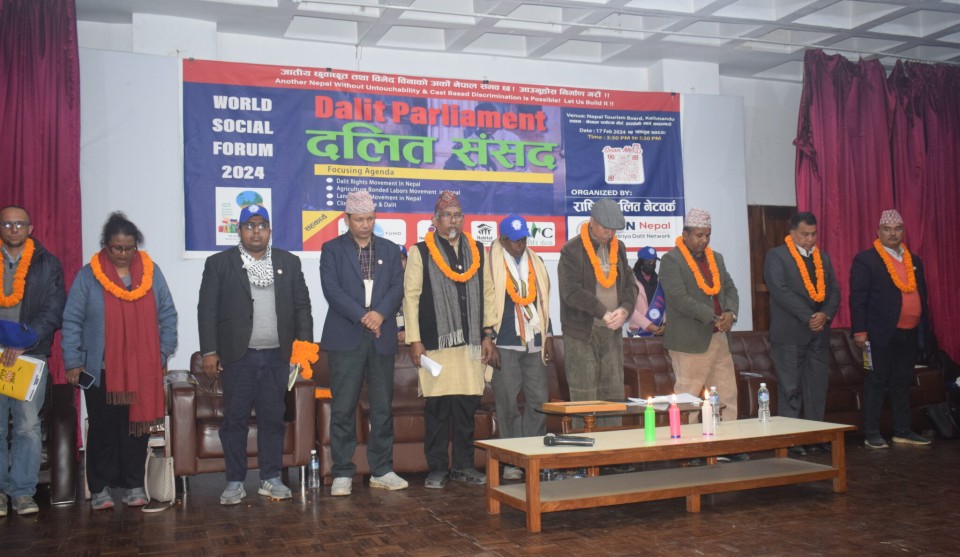Conclusion of Dalit Parliament: "Nepal without untouchability and discrimination is possible"

Conclusion of Dalit Parliament: "Nepal without untouchability and discrimination is possible"
17 February, 2024/Kathmandu:
During the 16th conference of the 16th World Social Forum held in Kathmandu with the slogan 'Another world is possible', Dalit community leaders and rights activists from South Asia, including Nepal, have debated in favor of another world without caste based discrimination and untouchability. Not only in Asia, but all over the world, some kind of discrimination persists, they also called for united resistance against it through the World Social Forum. In the event, caste discrimination and its various forms were not only discussed in Nepal, the leaders who came as representatives from the villages also announced that they will now fight unitedly to create a Nepal without caste discrimination and untouchability.
While the World Social Forum is being held in Nepal, the leaders of the Nepali Dalit movement have awakened the 'Dalit Parliament', which was practiced in the Far West before the establishment of the Republic, and the challenge of making laws by discussing and debating in the Dalit Parliament on issues that the sovereign parliament of the state could not do for the human rights, human dignity and self-respect of the Dalit community. Also given.
"When the state did not speak about the oppression of the Dalit community, the voice of Dalits was not heard from the Legislative Parliament, at that time we practiced the Dalit Parliament and made our voices heard," said Ganesh Bishwakarma, President of the Rastriya Dalit Network. . Dalits are also represented in Parliament. But the Dalit community is forced to suffer untouchability. There are no excuses, the culprits have not been punished. There is no land. Deprived of education. We felt the need for a Dalit Parliament to solve all these problems.
They formed a 'Dalit Parliament' in Dhangadhi in 2000AD and debated the recent liberation and rehabilitation. After that, the Dalit Parliament lasted until the 11th series until the establishment of the Republic and the constitution. "Because the state parliament did not speak the voice of Dalits, now the situation has come that Dalits have to run their own parliament," President Vishwakarma said, "The Dalit parliament woke up in the context of the World Social Forum. Our conclusion is that a Nepal without caste discrimination is possible. Human society is possible without all kinds of discrimination and injustice.
According to him, the Dalit Parliament should give the Dalit community the right to property. Human dignity and respect should be given. For that, it is necessary to bring this movement to a conclusion through class struggle. Dalit leaders, rights activists and people of the land narrated the stories of pain, experience, struggle and movement in the Dalit parliament held at the Bhrikutimandap under the umbrella of the World Social Forum.
The Parliament has passed various proposals to the world community on 9 points and to the Nepalese government on 16 points. In the same program, Paul Diwakar, the president of the World Forum of the communities suffering from caste discrimination, said that today's world is not free from discrimination and violence, and we have to fight for another world. Today's modern world is also going through caste system. I am from India, there are friends here from South Asia and many other countries," he said before, "The problem of caste is not only in Nepal or India or South Asia, it is all over the world. This is not only a problem of Dalits or Nepalis or Indians, it is a stigma on the entire human community. All the oppressed communities should now be united in solving such a problem.
He said that today's global human community must fight against discrimination based on caste, color and slavery. "There is no special religion, there is no different situation in any country, there is no lack of discrimination between people in developed countries," he said. Secretary Dr. Philip Vinod Picak said that oppressed communities should be able to rebel.
In the program, Shyam Shrestha, member of the Constituent Assembly and coordinator of the Study Committee on Free Kamaiya, Kamlari, Haliya and Harwacharwa, said that there are many forms of caste discrimination against Dalits in Nepal. He said that Dalits were deprived of education, health, land property and public administration by not only denying water, but still the culmination of such discrimination has not been completely eradicated. Nira Jairu, a former member of the House of Representatives, shared her experience of not being able to do much for the empowerment of the Dalit community even though she was in the Constituent Assembly. I reached there with the will to do many things for the liberation of Dalits. But our efforts were continuously failed," she said, "I am sad that I was not able to fight even after reaching the leadership.
Hari Sripaili, a member of the Constituent Assembly, criticized the Dalit community for making all kinds of contributions to the country's political change, but there has been no change in practice. "Parties used the anger and strength of Dalits, they used it in agitations, but when they reaped the rewards, there was no general representation of the Dalit community," he said. "The situation has not improved much today compared to yesterday." "Neither an effective role has been given in the parliament, nor responsibility has been given in the government," he said, "The parties have only made a ladder for the Dalit community." Neither do any work for their upliftment, nor any opportunity to do it


